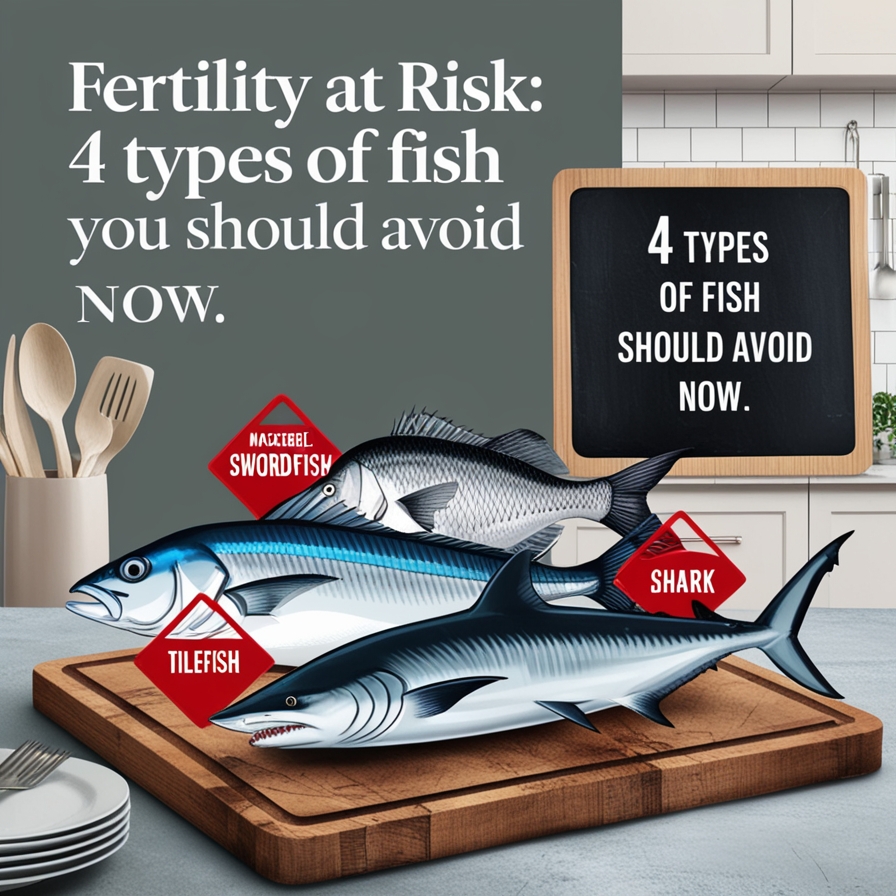Fish is often considered a healthy dietary choice, packed with essential nutrients like omega-3 fatty acids, protein, and vitamins. also, not all fish are created equal when it comes to their impact on male fertility, some types of fish may contain harmful substances that can interfere with hormonal balance, sperm production, and overall reproductive health, this article dives into the types of fish that may pose a risk and how to make safer choices for your fertility and overall well-being.
Fish That May Harm Male Fertility
1. Fish High in Mercury
-
Examples. Swordfish, shark, king mackerel, tilefish, and some types of tuna (especially bigeye tuna)
-
Why They’re Harmful. Mercury is a heavy metal that can accumulate in the body over time, high levels of mercury have been linked to reduced testosterone levels, lower sperm quality, and impaired sperm motility, chronic exposure can disrupt the endocrine system, leading to long term fertility issues.
-
How to Avoid. Go for fish with lower mercury levels, such as salmon, trout, sardines, and anchovies, limit consumption of high-mercury fish to rare occasions.
2. Farmed Fish with High PCB Levels
-
Examples. Farmed salmon, farmed trout, and farmed catfish.
-
Why They’re Harmful. Farmed fish often live in crowded environments and are exposed to higher levels of polychlorinated biphenyls (PCBs) these chemicals can mimic or disrupt hormones in the body, negatively impacting sperm production and hormonal balance.
-
How to Avoid. Choose wild-caught fish when possible, as they are generally less contaminated with harmful chemicals.
3. Fish from Polluted Waters
-
Examples. Fish caught near industrial zones or areas with high agricultural run off.
-
Why They’re Harmful. These fish may be contaminated with pesticides, dioxins, and other endocrine disrupting chemicals, such pollutants interfere with the body’s hormonal functions, leading to reduced fertility.
-
How to Avoid. Check local advisories before consuming fish caught in specific areas, stick to trusted sources for your seafood.
4. Processed and Canned Fish in Oil
-
Examples. Sardines, mackerel, and other fish packed in oil.
-
Why They’re Harmful. While not inherently dangerous, processed fish often contains added preservatives, sodium, and unhealthy fats, consuming these regularly can contribute to poor overall health, which indirectly affects fertility.
-
How to Avoid. Go for fresh or frozen fish and avoid varieties with excessive added oils or preservatives.
The Nutritional Flip Side, Fish That Support Fertility
Not all fish are harmful to fertility, in fact, certain types can boost reproductive health.
Salmon (Wild-Caught) Rich in omega-3 fatty acids, which improve blood flow to reproductive organs and enhance sperm quality.
-
Sardines. Low in mercury and high in beneficial fats.
-
Anchovies. Packed with nutrients and a sustainable seafood option.
-
Trout. A great source of lean protein and omega-3s.
Including these types of fish in your diet can promote overall health while supporting fertility.
Practical Tips for Men Concerned About Fertility
-
Diversify Your Protein Sources. Don’t rely solely on fish for protein. Include lean meats, eggs, legumes, and nuts in your diet.
-
Eat in Moderation. Even low-mercury fish should be consumed in reasonable amounts to avoid potential accumulation of harmful substances.
-
Boost Antioxidant Intake. Foods rich in antioxidants (like berries, nuts, and leafy greens) can combat oxidative stress caused by environmental toxins, improving sperm quality.
-
Stay Hydrated. Proper hydration supports metabolic functions and aids in flushing out toxins.
-
Consult a Specialist. If you have fertility concerns, consult a healthcare provider or nutritionist to develop a tailored diet plan.
Conclusion, Make Informed Choices for Better Health
Fish can be a valuable part of a healthy diet, but it’s essential to choose wisely, especially if you’re concerned about fertility, by avoiding high-mercury and contaminated fish and opting for safer, nutrient rich options, you can protect your reproductive health and overall well-being.
Share This Insight, If you found this article helpful, share it with your friends and loved ones, let’s spread awareness and inspire others to make informed dietary choices for better health.

